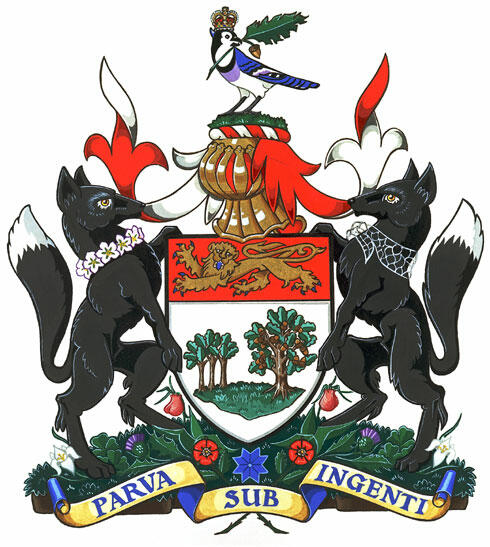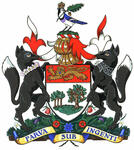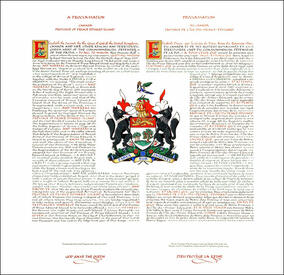The contents of this Register are intended for research purposes only. The heraldic emblems found in the Register may not be reproduced in any form or in any media without the written consent of the Canadian Heraldic Authority and/or the recipient.
Charlottetown, Prince Edward Island
Augmentation of Arms
April 26, 2002
Vol. IV, p. 195
Arms of the Province of Prince Edward IslandBlazonArgent on an island Vert, to the sinister an oak tree fructed, to the dexter thereof three oak saplings sprouting all proper, on a chief Gules a lion passant guardant Or; SymbolismThe shield is based on the design of the great seals deputed of Prince Edward Island in use since 1769. The oak tree and saplings allude to the motto. They have been interpreted as a reference to Prince Edward Island as a small colony within the British Empire, and latterly as the smallest province within Canada. The three saplings can refer to the three counties of the province. The lion is taken from the Royal Arms, and can also refer to Prince Edward, Duke of Kent, for whom the Province was named. |
CrestBlazonOn a grassy mount a blue jay (Cyanocitta cristata) reguardant crowned with the Royal Crown and bearing in its beak a leaf of the red oak tree (Quercus rubra L.) fructed proper; SymbolismThe blue jay is the official avian emblem of the Island. The red oak leaf in its beak is a reference to Prince Edward Island’s official tree. The Royal Crown worn by the blue jay indicates the Province’s co-sovereign status within Confederation. |
MottoBlazonPARVA SUB INGENTI; SymbolismMeaning “The small under the protection of the great”, this Latin phrase is taken from Book II of Virgil’s Georgics, and has been used by the province since 1769. |
SupportersBlazonTwo foxes (Vulpes fulva) Sable embellished Argent, that to the dexter gorged with a collar of potato blossoms proper, that to the sinister gorged with a length of fishnet Argent, both on a mount Vert set with a Mi'kmaq star Azure between lady's slipper flowers (Cypripedium acaule), red roses, thistles, shamrocks and white garden lilies proper; SymbolismThe silver foxes symbolize the importance of the ranched fur industry in the Province’s history. The garland of potato blossoms represents the Island’s main agricultural activity, and the length of fishnet alludes to the fishing industry. The foxes stand on a grassy mound adorned by flowers and the Mi’kmaq eight-pointed star. This star honours the Province’s first inhabitants and traditionally represents the sun, which plays a central role in the spiritual lives of the Mi’kmaq people. It is depicted as if woven of porcupine quill, a popular Mi’kmaq art form. The rose, lily, shamrock and thistle symbolize the English, French, Irish and Scottish heritage of the early settlers. The lady’s slippers are the floral emblem of Prince Edward Island. |
Additional InformationCreator(s)Original concept of the Heralds of the College of Arms, London (arms), and David Webber, assisted by the Heralds of the Canadian Heraldic Authority (crest and supporters) PainterLinda Nicholson CalligrapherJudith Bainbridge Recipient TypeCivil Institution
|



